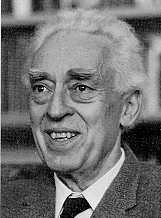| Profile | Major Works | Resources |
Piero Sraffa, 1898-1983.

One of the economic giants of the century, Piero Sraffa was at the same time one of the sparest writers of economics - yet each one of his few pieces was tremendous in its turn. Sraffa's 1926 article on returns to scale and perfect competitions (a revised version of his 1925 Italian paper) highlighted a glaring inconsistency in the Marshallian theory of the firm. As he concluded at the end of the famous 1930 Symposium on his work:
"I am trying to find what are the assumptions implicit in Marshall's theory; if Mr. Robertson regards them as extremely unreal, I sympathize with him. We seem to be agreed that the theory cannot be interpreted in a way which makes it logically self-consistent and, at the same time, reconciles it with the facts it sets out to explain. Mr. Robertson's remedy is to discard mathematics, and he suggests that my method is to discard the facts; perhaps I ought to have explained that, in the circumstances, I think it is Marshall's theory that should be discarded."
(Piero Sraffa, 1930, Economic Journal, March, p.93)
This led to developments in two directions -- towards a theory of production in general equilibrium terms and, more daringly, the development of theory of imperfect competition by Joan Robinson (apparently Sraffa was the only male she respected -- and feared.)
The shy, Italian-born Sraffa was brought by John Maynard Keynes to Cambridge in the 1920s. A close friend of the Italian revolutionary Antonio Gramsci, Sraffa has been sometimes considered a "closet Marxian" - and, apparently, he would sometimes be quite explicit about his loyalties - although the 1920s England was not exactly welcoming to Marxian radicals.
Sraffa quickly became a fixture in the Cambridge world. He was part of the legendary "cafeteria group" with Frank Ramsey and Ludwig Wittgenstein which explored the 1921 probability treatise of J.M. Keynes. Sraffa ganged up with Keynes to bury Friedrich Hayek in the business cycle debates.
Nonetheless, Sraffa's shyness in front of his students made lecturing a hellish experience. Ever resourceful, Keynes arranged for Sraffa to be appointed as a librarian of King's College and, to keep him busy, got the Royal Society to hand over the task of editing a new collected edition of David Ricardo's works over to him. Sraffa's painstaking and meticulous collecting and editing of Ricardo's works, begun in 1931, turned out to be a 20-year-task! Although already in the printers in 1943, the edition was delayed after the last-minute discovery of a trunk full of Ricardo's papers in Ireland. Publication finally began (after Maurice Dobb got on board as assistant) in 1953. It was a formidable edition. As George Stigler was to put it later in his review, "Ricardo was a fortunate man.. And now, 130 years after his death, he is as fortunate as ever : he has been befriended by Sraffa." (Stigler, 1953). Sraffa's introduction to the works was perhaps one of the most remarkable interpretations of the tenets of Classical and Neoclassical theory in the history of economic thought.
The outgrowth of these efforts was one of the longest-gestating works in economic theory. Begun in the 1920s, Sraffa's Production of Commodities by Means of Commodities, a terse, hundred-page text which finally emerged in 1960. This book solved and restated Ricardo's theory for the moderns - inspiring the "Classical Revival" spearheaded by the Neo-Ricardians at Cambridge and elsewhere in the 1960s and 1970s. He was also the first to depict the famous "reswitching" problem in capital theory for an industry as well as an economy - which led to the Cambridge Capital Controversy and fuelled the Neo-Ricardian School.
An interesting contribution of Sraffa was his relationship to philosopher Ludwig Wittgenstein - who claimed that it was Sraffa who helped provide the important stepping stones for his Philosophical Investigations - arguably the most important philosophical work of the twentieth century.
One last anecdote may be in order: in the 1930s or 1940s, Sraffa apparently came upon some money but he refused to invest until he found the "one perfect" investment. In 1945, after the bombs fell on Hiroshima and Nagasaki, Sraffa put all his money in Japanese government bonds - not believing that the defeated Japan would stay lying in postwar rubble for long. Needless to say, Japanese bonds were going for a song. This radical economist made quite a fortune.
|
Major Works of Piero Sraffa
|
HET
|
|
Resources on Piero Sraffa
|
All rights reserved, Gonšalo L. Fonseca
